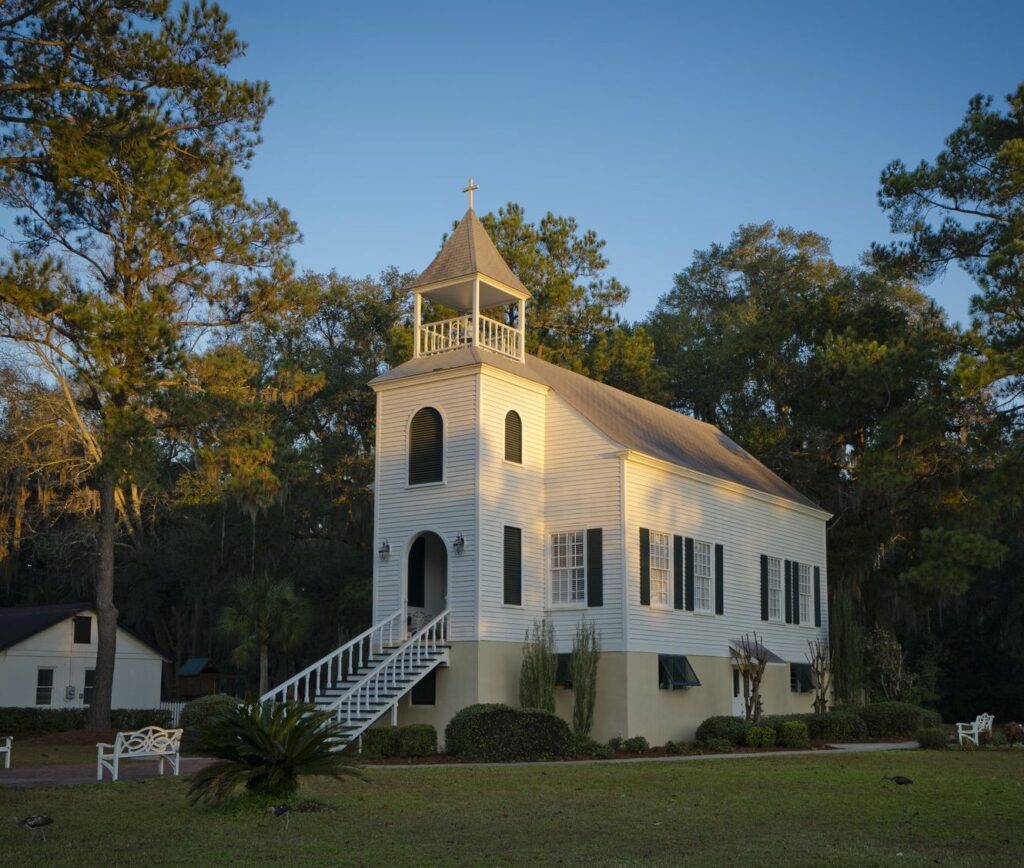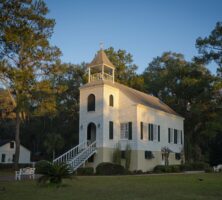The Presbyterian Church (U.S.A) (or PCUSA) is the largest Presbyterian body in Georgia, with more than 300 congregations and more than 81,000 members as of 2003. The church is also one of the oldest in the state, dating back to the colonial era.
Organization
The form of church government provides the name for the Presbyterian Church. The word presbyter (from the Greek presbuteros) means “elder.” Presbyterian congregations elect elders to serve on the session, or governing body, of a particular church. The pastor of a congregation serves as the moderator of its session and conducts its meetings. Individual churches in turn are organized into presbyteries, based on geographic area. The five presbyteries in Georgia are: the Presbytery of Greater Atlanta, Cherokee Presbytery, Northeast Georgia Presbytery, Flint River Presbytery, and Savannah Presbytery.

Presbyteries examine candidates for ministry, ordain new ministers, examine and supervise entering ministers, discipline ministers if cases of misconduct arise, and supervise the conduct of particular churches. All member churches of a presbytery staff the committees of the presbytery, so its work, even in cases of discipline, is an organic act of that community. In this way, Presbyterian churches are “connectional”; that is, they are united in their ministry and government.
Session meetings and presbytery meetings are held at least four times a year and more often as needed. Presbytery meetings may be attended by anyone. The voting members of a presbytery meeting are the pastors of the presbytery and the elders appointed by their session to attend.
The five presbyteries in Georgia are part of the Synod of the South Atlantic, the governing body of the presbyteries. Each presbytery in Florida, Georgia, and South Carolina sends elders and pastors to attend synod meetings. Much of a synod’s work involves supervising orphanages, colleges, schools, and seminaries. In Georgia the Synod of the South Atlantic supports the Johnson C. Smith Theological Seminary in Atlanta and the Columbia Theological Seminary and Agnes Scott College in Decatur. The synod also has a supportive relationship with the Rabun Gap–Nacoochee School in Rabun County.
The General Assembly is the highest governing body of the PCUSA. The commissioners to the General Assembly are elders and ministers chosen by each presbytery.
Doctrine and Theology
The constitution of the PCUSA has two major parts: the Book of Confessions and the Book of Order. The Book of Confessions includes the Apostles’ Creed, the Nicene Creed, the Westminster Confession of Faith, the Barmen Declaration, and other statements of faith. The Book of Order includes the Form of Government, the Directory for Worship, and the Rules of Discipline.
Presbyterians are part of the Calvinist theological tradition, which includes an emphasis upon predestination as found in the theology of John Calvin, a sixteenth-century French theologian who believed that God elects those who are “predestined” to salvation and that this election is not influenced by human efforts. Calvinist churches on the continent of Europe are called Reformed churches (for example, Dutch Reformed), while those originating in Scotland, England, and Ireland are called Presbyterian. Reformed and Presbyterian churches are found around the world and number more than 70 million communicants. Distinctive beliefs include an emphasis upon the sovereignty of God and the doctrine of election (spiritual predestination).

History in Georgia
When Georgia was founded as a colony in 1733, individual Presbyterians were among the first arrivals. Highland Scottish troops, recruited by General James Oglethorpe to fight the Spanish in Florida, were the first group of Presbyterians to arrive in Georgia. They established the town of Darien between Savannah and Fort Frederica. By the mid-1700s Presbyterian churches had been established in the state. The First Presbyterian Church in St. Marys is one of the oldest churches in Georgia.

Presbyterians in Georgia, as elsewhere, participated heavily on the patriot side in the American Revolution (1775-83). Afterwards, Presbyterians were active on the Georgia frontier. A number of Presbyterian ministers were missionaries to Native Americans, including the Cherokees, whom several Presbyterian ministers accompanied on the Trail of Tears.
Although the Presbyterian Church had historically been opposed to slavery, it had never explicitly condemned the practice. In the 1830s several issues, including slavery, divided Georgia’s Presbyterians into Old School and New School churches. Most Presbyterian churches, in Georgia and nationally, were Old School churches, which strove to maintain the denomination’s emphasis on Calvinist doctrine and to resist the New School’s emphasis on such societal reform efforts as temperance and abolition. The outbreak of the Civil War (1861-65), however, forced southern churches of both the Old and New schools to choose between loyalty to the national government and loyalty to the state government. In December 1861 presbyteries from throughout the South met at the First Presbyterian Church in Augusta and organized the Presbyterian Church in the Confederated States of America (PCCSA), thereby separating from the national Presbyterian Church. After the war Presbyterians in the South became members of the Presbyterian Church in the United States (PCUS), popularly known as the Southern Presbyterian Church.
In 1916 African American Presbyterian churches were organized into a synod, which in 1917 was named the Snedecor Memorial Synod. After 1951 African American churches in Georgia belonged to the old Synod of Georgia.

In the 1970s concern over theological liberalism, which embraces modern ideas and encourages the individual interpretation of Scripture, in the seminaries and the church in general led conservatives to form the Presbyterian Church in America. In 1983 the United Presbyterian Church in the United States of America (also known as the Northern Presbyterian Church) reunited with the PCUS to form the PCUSA.
The PCUSA in Georgia has become increasingly diverse, and several congregations speak primarily Korean, Chinese, Vietnamese, Portuguese, Spanish, and other languages. Many new ethnic churches represent lands served during the nineteenth and twentieth centuries by Georgia Presbyterian missionaries.










